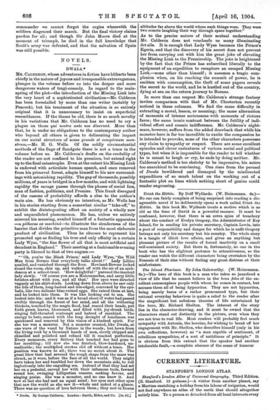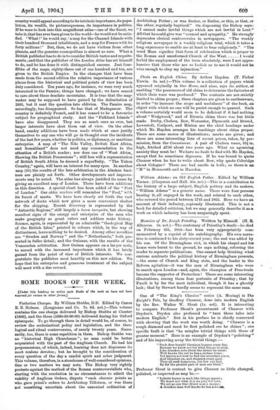country would appeal according to its intrinsic importance, its popu-
lation, its wealth, its picturesqueness, its importance in politics. If he were to look into this magnificent atlas—one of the finest, we take it, that has ever been given to the world—he would not be satis- fied. What!' he would say,' a map for the Channel Islands with their hundred thousand inhabitants, and a map for France with its forty millions !' But, then, we do not have visitors from other planets, and the genuine cosmopolitan is almost as rare. What a British publisher has to do is to consider British tastes and require- ments ; andthat the publisher of the London Atlas has set himself to do, and:he has done it with distinguished success. Just four- fifths of the maps, eighty-three out of one hundred and ten, are given to the British Empire. In the changes that have been made from the second edition the relative importance of various places from the historical and political points of view has been duly considered. Ten years ago, for instance), we were very much interested in the Pamirs things have changed ; we have ceased to care about these desolate mountains. It is true that the map- maker may be supposed to have gained by the delimitation of 1895, but it sent the question into oblivion. The Pamirs map, accordingly, has disappeared. So has that of Madagascar. The country is definitely French, and it has ceased to be a favourite subject for geographical study. And the "Falkland Islands" have also disappeared. They are as much ours as ever, but larger interests have shut them out of view. On the other hand, sundry additions have been made which at once justify themselves to any one who will go in thought over the incidents of the last few years, whether in politics, or diplomacy, or maritime enterprise. A map of "The Nile Valley, British East Africa, and Somaliland" does not need any commendation to the attention of a British reader ; nor does one of "West Africa, Showing the British Possessions"; still less will a representation of British South Africa be deemed a superfluity. "The Yukon Country," again, will have an interest for many eyes. In another map (61) the results of the late arbitration in the Alaskan busi- ness are plainly set forth. Other developments and improve- ments may be noted. The atlas has always justified its name by giving an excellent map of London. There have been additions in this direction. A special chart has been added of the "Port of London." Our older readers will remember the "Pool," with its forest of masts. We have here clearly set forth the vast network of docks which now gives a more convenient shelter for the shipping. Recent discovery is represented by the "Antarctic Regions," still largely a terra incognita, but showing manifest signs of the energy and enterprise of the men who make geography as great rulers and soldiers make history. Science, again, is represented by an admirable "Geological Map of the British Isles," printed in colours which, in the way of distinctness, leave nothing to be desired. Among other novelties are "Sweden and Norway" and the "Netherlands," both pre- sented in fuller detail ; and the Guianas, with the results of the Venezuelan arbitration. New Guinea appears on a larger scale, to accord with the increased importance which it has lately gained from the point of view of British interests. We con- gratulate the publisher most heartily on this new edition. We hope that his enterprise and generous treatment of the subject will meet with a due reward.
SOME BOOKS OF THE WEEK.
[Bader this heading see notice such Books of the week os have not boon ...rod for review is other fem..] Visitation Charges. By William Stubbs, D.D. Edited by Canon E. E. Holmes. (Longmans and Co. 7s. 6d. net.)—This volume contains the one charge delivered by Bishop Stubbs at Chester (1W), and the three (1890-93-96-99) delivered during his Oxford episcopate. To go through them in detail would be, of course, to review the ecclesiastical policy and legislation, and the theo- logical and ritual controversies, of nearly twenty years. Neces- sarily, too, thereto some repetition in them. Bishop Stubbs was an "historical High Churchman "; no man could be better acquainted with the past of the Anglican Church. He had his preposseasions, of which, indeed, learning does not dispossess its most zealous devotee; but he brought to the consideration of every question of the days candid spirit and sober judgment. This volume, therefore, is a storehouse of well-considered opinions. One or two matters we may note. The Bishop very rightly protests against the method of the Roman controversialists who, starting with the resolutioa in no circumstances to admit the validity of Anglican Orders, dispute "such obscure points as who gave priest's orders to Archbishop Tillotson, or was there not something uncertain about the canonical ordination of
long experience to enable me at least to bear religiously " "The word Mass signifies that form of celebration which is proper to the Roman and unreformed Church of the West I would forbid the employment of the term absolutely, were I not appre- hensive that those who are so foolish as to use it would not be wise enough to obey my injunction."
Chats on English China. By Arthur Hayden. (T. Fisher Unwin. 5s. net.)—This volume is a collection of papers which appeared originally in Our Home, and aims, says its anther, at enabling "the possessors of old china to determine the factories at which their ware was produced." The contents are not strietly limited to china proper ; three chapters are given to earthenware, in order "to increase the scope and usefulness" of the book, an object with which no one will be purist enough to quarrel. Such a volume certainly would seem to be deficient if it had nothing about "Wedgwood," and of Etruria china there was but little made. Derby, Chelsea, Bow, Worcester, Plymouth and Bristol, Lowestoft, Coalport, and Minton are the chief headings under which Mr. Hayden arranges his teachings about china proper. There are some scores of illustrations ; marks are given ; and there are some interesting Rata of recent prices, taken, by per- mission, from the Connoisseur. A pair of Chelsea vases, 169 in. high, fetched 2756 about two years ago. What an agonising anxiety they must be I We have no fault to find with Mr. Hayden, except that he sometimes digresses. If he was bound to quote Chaucer when he has to write about Bow, why quote Coleridge about Cologne F There are bad smells in bath; so there is an "Id" in Monmouth and in Macedon.
William Adams Old English Potter. Edited by William Turner. (Chapman and Hall. 30s. not )—This is a contribution to the history of a largo subject. English pottery and its makers. "William Adams" is a generic name. There were four persona bearing it, all engaged in the work, and related to each other, who covered the period between 1746 and 1865. Here we have an account of their industry, copiously illustrated. This is not a book for detailed criticism, but we may generally describe it as a work on which industry has been unsparingly spent.
Memoirs of Dr. Joseph Priestley. Written by Himself. (H. B. Allenson. is. net.)—The centenary of Priestley's death—he died on February 6th, 1804—has been very appropriately com- memorated by a reprint of his autobiography.. His own narra- tive is continued to his sixty-second year; the cost was added by his son. Of the Birmingham riot, in which his chapel and his house were burnt to the ground, he says nothing, referring the reader to separate publications. One cannot help thinking what curious contrasts the political history of Birmingham presents, —the scene of Church and King riots, and the leader in the Reform agitation—it was the men of Birmingham who were to march upon London—and, again, the champion of Free-trade become the supporter of Protection ! There are some interesting illustrations, among them four portraits of Priestley; that by Fuseli is by far the most individual, though it has a ghostly look; that by Stewart hardly seems to represent the same man.
One of "The King's Classics" series (A. Moring) is The Knight's Tale, by Geoffrey Chaucer, done into modern . English by the Rev. Walter W. Skeet (le. net). It is interesting to compare Professor Skeet's presentment of Chaucer with Dryden's. Dryden also professed to "turn these tales into modern English." But in his preface he is chiefly concerned with showing that the work was worth doing. "Chaucer is a rough diamond and must be first polished ere he shines" ; one specific fault is that "he mingles trivial things with those of greater moment." Here is an example of Dryden's " polishing " and of his improving away the trivial things
"Seek dear-bought blessings happen every day, Because we know not for what things to pray. Like drunken sots about the street we roam : Well knows the sot be bass certain home: Yet knows not how to find the uncertain place, Aul blunders on, and staggers every puce. Thus all seek happiness, but few can find. By far the greater part of men are blind."
Professor Skeet is content to give Chaucer as little changed, polished, or improved as may be
Infinite horns,. such:like things appear ; We know not what it is we pray for bore. We act noose that drunk is as a mouse; A drunken man well karma he bog a Lou"







































 Previous page
Previous page